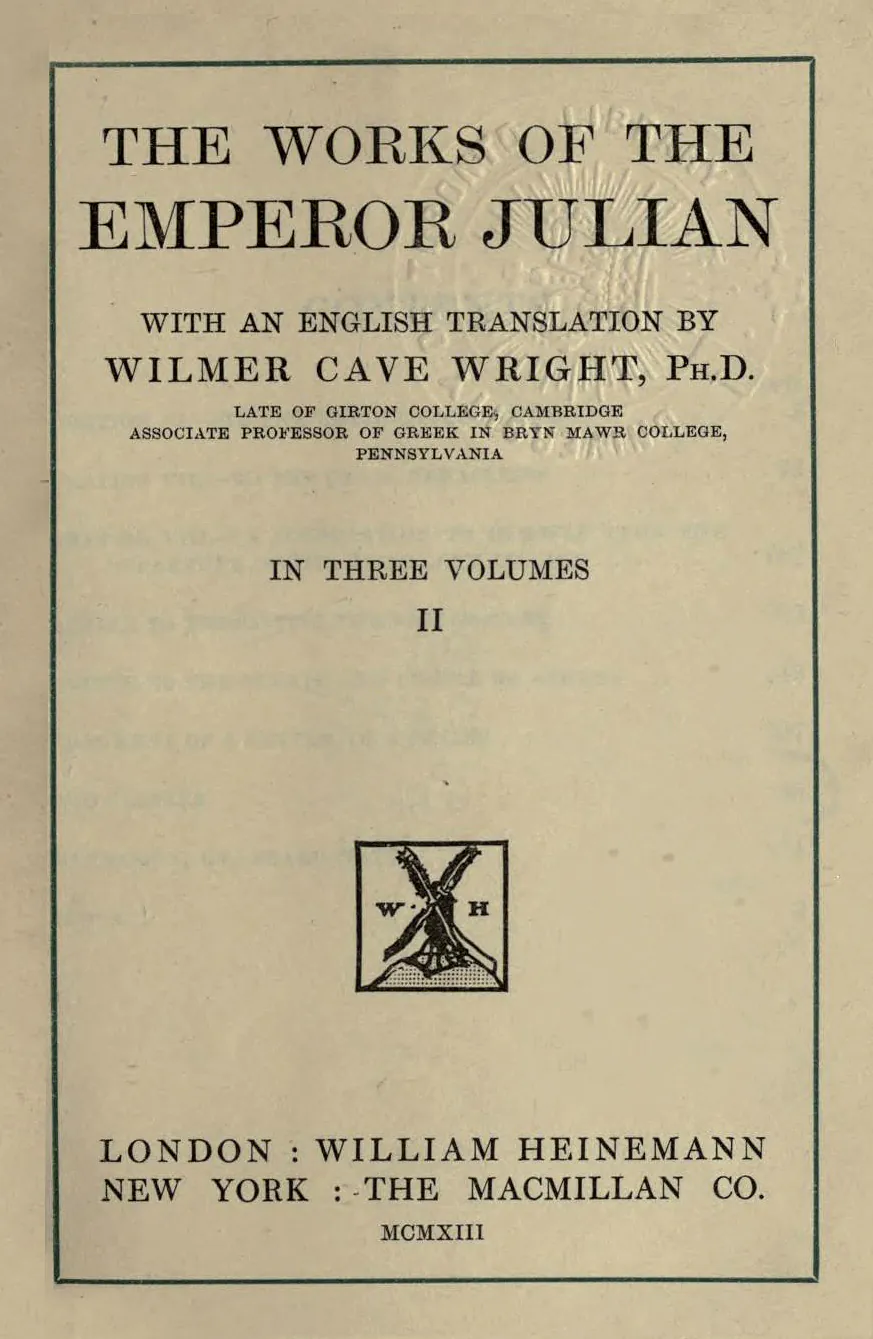[A]
ἐπειδὴ παρὰ τὸν ἐκεῖσε βασιλέα πρῴην ἀφίκετο, μνήμῃ τῶν τῇδε πολλοὺς μὲν ὀρχηστὰς αὐτοῖς ἐπαγαγεῖν, ἄλλα δὲ τὰ ἐντεῦθεν ἀγαθὰ τοιαῦτα, καὶ δή καὶ τέλος ὡς ἐνεδέησεν ἔτι κοτυλιστοῦ· τοῦτο δ ̓ ὑμεῖς ἴστε πρὸς τῷ ἔργῳ τὸ ὄνομα· καὶ τοῦτον ἐνθένδε ἐκάλει πόθῳ καὶ ἔρωτι τῆς σεμνῆς παρ ̓ ὑμῖν διαίτης. οἱ Κελτοὶ δὲ τὸν μὲν κοτυλιστὴν ἠγνόησαν,
[B]
ἐδέξατο γὰρ αὐτὸν αὐτίκα τὰ βασίλεια, τοὺς ὀρχηστὰς δὲ ἐπιτραπέντας ἐπιδείκνυσθαι1ἐπιδείκνυσθαι Hertlein would add. ἐν τῷ θεάτρῳ τὴν τέχνην εἴασαν οἰόμενοι τοῖς νυμφολήπτοις αὐτοὺς ἐοικέναι. καὶ ἦν αὐτοῖς ἐκεῖ παραπλησίως ἐμοὶ καταγελαστότατον τὸ θέατρον· ἀλλ ̓ οἱ μὲν ὀλίγοι πολλῶν κατεγέλων, ἐγὼ δὲ ξὺν ὀλίγοις ἐνθάδε γελοῖος ὑμῖν ἅπασι τὰ πάντα φαίνομαι.
[C]
Καὶ οὐκ ἀγανακτῶ τῷ πράγματι. καὶ γὰρ ἂν εἴην ἄδικος εἰ μὴ καὶ τοῖς παροῦσι στέργοιμι, διαφερόντως ἀσπασάμενος ἐκεῖνα. Κελτοὶ μὲν γὰρ οὕτω με δι ̓ ὁμοιότητα τρόπων ἠγάπησαν, ὥστε ἐτόλμησαν οὐχ ὅπλα μόνον ὑπὲρ ἐμοῦ λαβεῖν, ἀλλὰ καὶ χρήματα ἔδωκαν πολλά, καὶ παραιτούμενον ὀλίγου καὶ ἐβιάσαντο λαβεῖν, καὶ πρὸς πάντα ἑτοίμως ὑπήκουσαν. ὃ δὲ δὴ μέγιστον, ἐκεῖθεν εἰς ὑμᾶς ἐφέρετο πολὺ τὸ ἐμὸν ὄνομα, καὶ ἐβόων πάντες ἀνδρεῖον, συνετόν, δίκαιον, οὐ πολέμῳ μόνον ὁμιλῆσαι δεινόν,
[D]
ἀλλὰ καὶ εἴρηνῃ χρήσασθαι δεξιόν, εὐπρόσιτον, πρᾷον· ὑμεῖς δὲ αὐτοῖς ἀντιδεδώκατε νῦν ἐνθένδε πρῶτον μέν, ὅτι παρ ̓ ἐμὲ τὰ τοῦ κόσμου πράγματα ἀνατέτραπται· σύνοιδα δὲ οὐδὲν ἀνατρέπων ἐμαυτῷ οὔτε ἑκὼν οὔτε ἄκων· εἶτα, ὡς ἐκ τοῦ πώγωνός μου χρὴ πλέκειν σχοινία, καὶ ὅτι πολεμῶ τῷ Χῖ, πόθος δὲ ὑμᾶς εἴσεισι τοῦ Κάππα. καὶ ὑμῖν γε αὐτὸ οἱ πολιοῦχοι τῆσδε τῆς πόλεως θεοὶ διπλοῦν δοῖεν, ὅτι πρὸς τούτῳ
[A]
he went to the court of the king in that country, he took with him to remind him of your habits here a number of dancers and other such delights from this city; and then finally since he still needed a cotylist2We do not know what sort of performance was given by a cotylist; he was evidently a mime and may have played with cups; κοτύλη = a pint-cup. – you know the word and the thing too – he invited him also from here, because of his longing and love for the austere mode of life that prevails with you. Now the Celts never made the acquaintance of the cotylist,
[B]
since he was at once admitted into the palace; but when the dancers began to display their art in the theatre, the Celts left them alone because they thought that they were like men stricken with nympholepsy. And the theatre seemed to the men in that country highly ridiculous, just as it does to me; but whereas the Celts were a few ridiculing many, I here along with a few others seem absurd in every way to all of you.
[C]
This is a fact which I do not resent. And indeed it would be unjust of me not to make the best of the present state of things, after having so greatly enjoyed the life among the Celts. For they loved me so much, on account of the similarity of our dispositions, that not only did they venture to take up arms on my behalf, but they gave me large sums of money besides; and when I would have declined it, they almost forced me to take it, and in all things readily obeyed me. And what was most wonderful of all, a great report of me travelled thence to your city, and all men proclaimed loudly that I was brave, wise and just, not only terrible to encounter in war,
[D]
but also skilful in turning peace to my account, easy of access and mild-tempered. But now you have sent them tidings from here in return, that in the first place the affairs of the whole world have been turned upside down by me – though indeed I am not conscious of turning anything upside down, either voluntarily or involuntarily; secondly, that I ought to twist ropes from my beard, and that I war against the Chi and that you begin to regret the Kappa. Now may the guardian gods of this city grant you a double allowance of the Kappa!3i.e. may they have two such rulers as Constantius.
EN translation: Wilmer Cave Wright, 1913
LEARN MORE
Place your mouse over a term to see corresponding popup from Wikipedia.
ALL PAGES

| Title | London: The Works of the Emperor Julian, Volume II/III |
| Publisher | London: William Heinemann |
| Year | 1913-23 |
| Pages | 416-511 pp. [vol. II: 538 pp.] |
| Translation | Wilmer Cave Wright. PhD |
| Editors | T.E. Page and W.H.D. Rouse |


